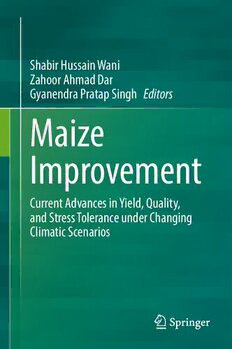Download Maize Improvement: Current Advances in Yield, Quality, and Stress Tolerance under Changing Climatic Scenarios PDF Free - Full Version
Download Maize Improvement: Current Advances in Yield, Quality, and Stress Tolerance under Changing Climatic Scenarios by Shabir Hussain Wani, Zahoor Ahmad Dar, Gyanendra Pratap Singh in PDF format completely FREE. No registration required, no payment needed. Get instant access to this valuable resource on PDFdrive.to!
About Maize Improvement: Current Advances in Yield, Quality, and Stress Tolerance under Changing Climatic Scenarios
Maize is one of the most generally grown cereal crops at global level, followed by wheat and rice. Maize is the major crop in China both in terms of yield and acreage. In 2012, worldwide maize production was about 840 million tons. Maize has long been a staple food of most of the global population (particularly in South America and Africa) and a key nutrient resource for animal feed and for food industrial materials. Maize belts vary from the latitude 58° north to the latitude 40° south, and maize ripens every month of the year. Abiotic and biotic stresses are common in maize belts worldwide. Abiotic stresses (chiefly drought, salinity, and extreme temperatures), together with biotic stresses (primarily fungi, viruses, and pests), negatively affect maize growth, development, production and productivity. In the recent past, intense droughts, waterlogging, and extreme temperatures have relentlessly affected maize growth and yield. In China, 60% of the maize planting area is prone to drought, and the resultant yield loss is 20%–30% per year; in India, 25%–30% of the maize yield is lost as a result of waterlogging each year. The biotic stresses on maize are chiefly pathogens (fungal, bacterial, and viral), and the consequential syndromes, like ear/stalk rot, rough dwarf disease, and northern leaf blight, are widespread and result in grave damage. Roughly 10% of the global maize yield is lost each year as a result of biotic stresses. For example, the European corn borer [ECB, Ostrinianubilalis (Hübner)] causes yield losses of up to 2000 million dollars annually in the USA alone in the northern regions of China, the maize yield loss reaches 50% during years when maize badly affected by northern leaf blight. In addition, abiotic and biotic stresses time and again are present at the same time and rigorously influence maize production. To fulfill requirements of each maize-growing situation and to tackle the above mentions stresses in an effective way sensibly designed multidisciplinary strategy for developing suitable varieties for each of these stresses has been attempted during the last decade. Genomics is a field of supreme significance for elucidating the genetic architecture of complex quantitative traits and characterizing germplasm collections to achieve precise and specific manipulation of desirable alleles/genes. Advances in genotyping technologies and high throughput phenomics approaches have resulted in accelerated crop improvement like genomic selection, speed breeding, particularly in maize. Molecular breeding tools like collaborating all omics, has led to the development of maize genotypes having higher yields, improved quality and resilience to biotic and abiotic stresses. Through this book, we bring into one volume the various important aspects of maize improvement and the recent technological advances in development of maize genotypes with high yield, high quality and resilience to biotic and abiotic stresses
Detailed Information
| Author: | Shabir Hussain Wani, Zahoor Ahmad Dar, Gyanendra Pratap Singh |
|---|---|
| Publication Year: | 2023 |
| ISBN: | 9783031216398 |
| Pages: | 338 |
| Language: | English |
| File Size: | 10.519 |
| Format: | |
| Price: | FREE |
Safe & Secure Download - No registration required
Why Choose PDFdrive for Your Free Maize Improvement: Current Advances in Yield, Quality, and Stress Tolerance under Changing Climatic Scenarios Download?
- 100% Free: No hidden fees or subscriptions required for one book every day.
- No Registration: Immediate access is available without creating accounts for one book every day.
- Safe and Secure: Clean downloads without malware or viruses
- Multiple Formats: PDF, MOBI, Mpub,... optimized for all devices
- Educational Resource: Supporting knowledge sharing and learning
Frequently Asked Questions
Is it really free to download Maize Improvement: Current Advances in Yield, Quality, and Stress Tolerance under Changing Climatic Scenarios PDF?
Yes, on https://PDFdrive.to you can download Maize Improvement: Current Advances in Yield, Quality, and Stress Tolerance under Changing Climatic Scenarios by Shabir Hussain Wani, Zahoor Ahmad Dar, Gyanendra Pratap Singh completely free. We don't require any payment, subscription, or registration to access this PDF file. For 3 books every day.
How can I read Maize Improvement: Current Advances in Yield, Quality, and Stress Tolerance under Changing Climatic Scenarios on my mobile device?
After downloading Maize Improvement: Current Advances in Yield, Quality, and Stress Tolerance under Changing Climatic Scenarios PDF, you can open it with any PDF reader app on your phone or tablet. We recommend using Adobe Acrobat Reader, Apple Books, or Google Play Books for the best reading experience.
Is this the full version of Maize Improvement: Current Advances in Yield, Quality, and Stress Tolerance under Changing Climatic Scenarios?
Yes, this is the complete PDF version of Maize Improvement: Current Advances in Yield, Quality, and Stress Tolerance under Changing Climatic Scenarios by Shabir Hussain Wani, Zahoor Ahmad Dar, Gyanendra Pratap Singh. You will be able to read the entire content as in the printed version without missing any pages.
Is it legal to download Maize Improvement: Current Advances in Yield, Quality, and Stress Tolerance under Changing Climatic Scenarios PDF for free?
https://PDFdrive.to provides links to free educational resources available online. We do not store any files on our servers. Please be aware of copyright laws in your country before downloading.
The materials shared are intended for research, educational, and personal use in accordance with fair use principles.

